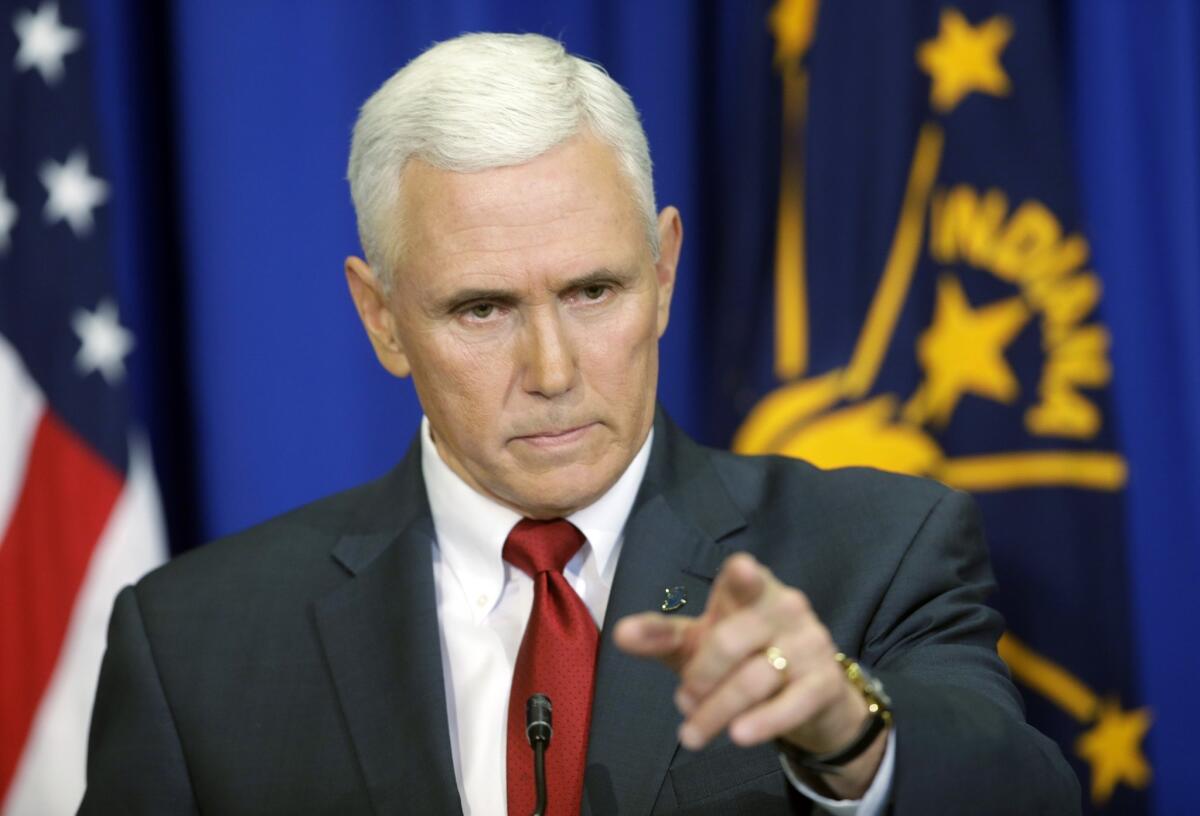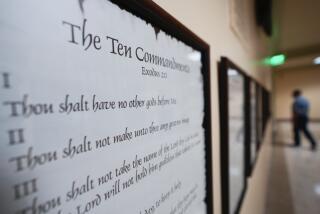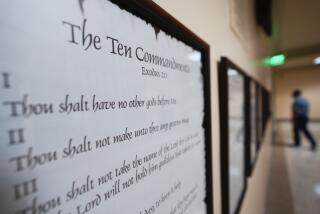Op-Ed: 3 factors that make Indiana’s religion law different from other states’

Indiana’s Religious Freedom Restoration Act, signed by Gov. Mike Pence late last week, is virtually identical to a Clinton-era federal law as well as statutes on the books in 19 other states. Nowhere does the Indiana law explicitly authorize discrimination. Yet critics from Tim Cook of Apple — who opined against the law in the Washington Post — and the actor George Takei — who said tourists and companies should boycott Indiana — are absolutely right to worry that the state’s intention is to allow discrimination against gays and lesbians based on claims of religious freedom.
The Indiana statute is the culmination of a long, murky legal history that reaches back to the 1990 Supreme Court case Employment Division vs. Smith, which significantly changed the standard interpretation of the 1st Amendment’s free exercise clause. At issue was whether a Native American group could use peyote in religious rituals in violation of an Oregon law. The court ruled that it could not — because the state law was “neutral,” in that it was not motivated by a desire to curtail religious rights, and because it applied to everyone in the state.
Legal precedent prior to 1990 dictated that the government could substantially burden a person’s practice of his or her religion only if its action was necessary to achieve a compelling government purpose. But in Smith, the court established that the free exercise clause could not be used to challenge a neutral law of general applicability no matter how much the law burdened religion.
So, before Smith, a priest in a dry county who wanted to use wine in communion surely would have prevailed in court. After Smith, he would have lost because the law prohibiting consumption of alcohol was a neutral law of general applicability.
In 1993, Congress, with strong bipartisan support, passed and President Clinton signed the federal Religious Freedom Restoration Act. Its stated goal was to restore religious freedom by statute to what it previously had been under the Constitution. The law provides that whenever the government substantially burdens religion, even with a neutral law of general applicability, its action is illegal unless proven to be necessary to achieve a compelling government interest.
The next development came in 1997, when the Supreme Court declared the act unconstitutional as applied to state and local governments because it exceeded the scope of Congress’ power. But the law remained constitutional as applied to the federal government, and was the basis for the court’s decision last June in Burwell vs. Hobby Lobby. In that case, the court held, 5 to 4, that it violated the Religious Freedom Restoration Act to require a closely held corporation to provide contraceptive coverage if that contradicted its owners’ religious beliefs.
The new Indiana law has the same title and contains the same language as the federal statute. Like the federal law, the Indiana version provides: “A governmental entity may substantially burden a person’s exercise of religion only if the governmental entity demonstrates that application of the burden to the person: (1) is in furtherance of a compelling governmental interest; and (2) is the least restrictive means of furthering that compelling governmental interest.”
But the Indiana and federal statutes are not wholly identical. The Indiana law, unlike the federal RFRA, builds on Hobby Lobby by expressly providing protection to corporations and other business entities. That’s one reason to worry that the purpose of the Indiana law is to allow discrimination against same-sex couples based on business owners’ religious beliefs.
Another reason for concern is timing. Why is Indiana adopting the law now, 25 years after Employment Division vs. Smith and 22 years after the enactment of the federal statute? There is a widespread consensus across the political spectrum that the Supreme Court is about to recognize a right to marriage equality for gays and lesbians and hold that state laws prohibiting same-sex marriage violate the Constitution. This law appears to be a reaction to that development.
The rhetoric surrounding the Indiana law is also troubling. In fact, over and over in his interviews, Pence has refused to deny that the law would permit discrimination. He also was emphatic that there would be no expansion of rights for gays and lesbians on his “watch.”
This is why there are loud protests against the Indiana law and calls for boycotts of the state. But Indiana could easily solve this controversy by amending the law to provide that no one can discriminate against others based on sexual orientation, sex or race under the statute or on the grounds of religious beliefs.
Erwin Chemerinsky is dean of the UC Irvine School of Law.
Follow the Opinion section on Twitter @latimesopinion and Facebook
More to Read
Sign up for Essential California
The most important California stories and recommendations in your inbox every morning.
You may occasionally receive promotional content from the Los Angeles Times.










